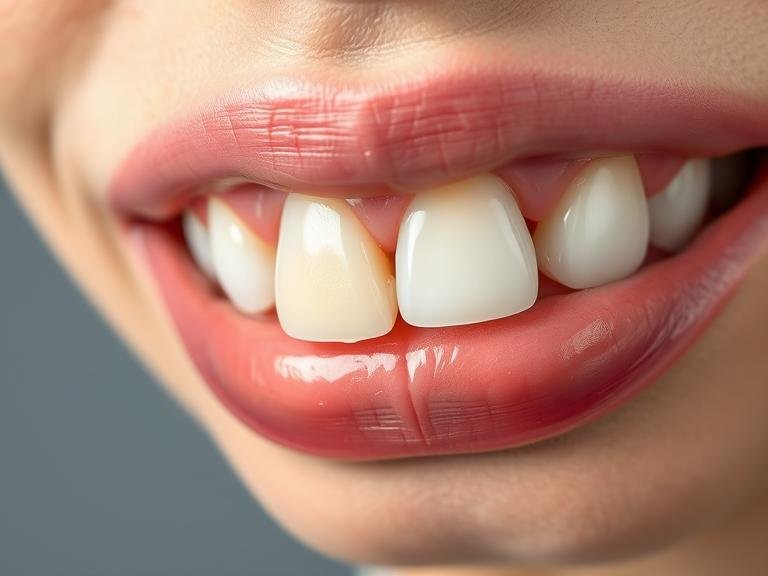Zyn Gum Recession: In recent years, the landscape of nicotine consumption has undergone a significant shift. As traditional smoking declines, nicotine pouches like Zyn have surged in popularity, particularly among those seeking a smoke-free, discreet alternative. Marketed as a tobacco-free product, these small pouches are placed between the gum and lip, delivering a dose of nicotine without the combustion and smoke of cigarettes. However, this very method of delivery has sparked a growing concern among dental professionals and users alike: can using Zyn cause gum recession?
This article delves into the scientific and biological mechanisms at play, exploring the connection between nicotine pouches and oral health, with a specific focus on gum tissue.
Table of Contents
Understanding the Basics: What is Gum Recession?
Before examining Zyn’s role, it’s crucial to understand what gum recession is. Gum recession is a form of periodontal disease where the margin of the gum tissue that surrounds the teeth wears away or pulls back, exposing more of the tooth or its root. This creates “pockets” or gaps between the teeth and gum line, making it easy for disease-causing bacteria to build up.
If left untreated, the supporting tissue and bone structures of the teeth can be severely damaged, potentially leading to tooth loss. Common signs of gum recession include:
- Teeth that appear longer than normal.
- A notch felt near the gum line.
- Tooth sensitivity to hot, cold, or sweet stimuli.
- Bleeding after brushing or flossing.
The Culprit: It’s Not Just the Pouch, It’s the Nicotine
To understand the potential link, we must separate the physical presence of the pouch from the pharmacological effect of its primary ingredient: nicotine.
1. The Physical Irritation Factor
The Zyn pouch itself is a small, teabag-like sachet containing nicotine, flavorings, sweeteners, and plant-based fibers. While designed to be comfortable, its mere presence in the vestibule of the mouth (the space between the cheek/lip and the gums) creates constant, localized physical contact and friction. For some users, especially those who habitually place the pouch in the exact same spot, this can lead to mechanical irritation. The gum tissue is delicate, and persistent rubbing or pressure can contribute to inflammation and, over a long period, potentially initiate a process of tissue breakdown and recession. This is similar in concept to the recession caused by aggressive tooth brushing or ill-fitting dental appliances.
2. The Vasoconstrictive Power of Nicotine
This is where the primary biological mechanism comes into play. Nicotine is a potent vasoconstrictor. This means it causes the narrowing of small blood vessels throughout the body, including those in the gums.
Healthy gums rely on a robust blood supply. This circulation delivers oxygen and essential nutrients to the gum tissue and removes waste products. It’s also the foundation of the body’s immune response in the mouth, sending white blood cells and antibodies to fight off bacteria.
When nicotine is absorbed through the gum tissue, it constricts these blood vessels. This leads to:
- Reduced Blood Flow: The gums receive less oxygen and nutrients, impairing their ability to stay healthy and repair themselves from daily wear and tear.
- Weakened Immune Response: With a compromised blood supply, the gums are less equipped to fight off the bacteria in plaque. This makes the tissue more susceptible to gingivitis (gum inflammation) and, eventually, periodontitis (a severe gum infection that damages the soft tissue and can destroy the bone that supports your teeth).
- Masking of Symptoms: Perhaps one of the most insidious effects is that nicotine can hide the early warning signs of gum disease. Reduced blood flow means less bleeding when brushing or flossing—a classic symptom of gingivitis. A user might mistakenly believe their gums are healthy because they don’t bleed, while an underlying infection is progressing unnoticed.
Is “Zyn Gum Recession” a Direct Cause or an Aggravating Factor?
Based on current dental understanding, it is inaccurate to state that Zyn is a direct and sole cause of gum recession in the same way that, for instance, a specific traumatic injury would be. The relationship is more nuanced.
Zyn, and nicotine pouches in general, are best understood as a significant aggravating factor and a major risk multiplier.
An individual with otherwise excellent oral hygiene, healthy genetics, and no pre-existing conditions may use Zyn and experience only minor irritation. However, for someone already predisposed to gum issues—due to genetics, less-than-perfect oral hygiene, teeth grinding, or a history of periodontal disease—the introduction of Zyn can be the tipping point.
The combination of physical irritation and the vasoconstrictive effects of nicotine creates a perfect storm. It weakens the gum tissue’s defenses and its ability to heal, allowing the constant assault of oral bacteria to cause damage more easily and rapidly. This accelerates the process of recession that might have otherwise occurred slowly or not at all.
Comparative Risk: Zyn vs. Smoking
It is a common question: is Zyn better or worse for your gums than smoking? From a systemic health perspective, Zyn eliminates the risk of lung cancer, emphysema, and other diseases associated with inhaling smoke. However, from a strictly oral health standpoint, the comparison is complex.
Cigarettes also deliver nicotine (a vasoconstrictor) and contain thousands of other harmful chemicals that damage oral tissues. However, the contact is more generalized throughout the mouth. Zyn, in contrast, delivers a highly concentrated dose of nicotine directly to a very localized area of the gum tissue. This focused, sustained exposure to both the pouch and the nicotine may pose a unique and significant threat to the gingival tissue in that specific spot.
Protecting Your Oral Health While Using Nicotine Pouches
If you choose to use Zyn, being proactive about your oral health is non-negotiable.
- Rotate Placement: Do not place the pouch in the same spot every time. Consistently switch sides of your mouth to give the gum tissue time to recover.
- Meticulous Oral Hygiene: Brush gently twice a day with a soft-bristled toothbrush and floss daily. The goal is to remove plaque without causing additional abrasion to the gums.
- Stay Hydrated: Drinking water helps maintain saliva flow, which is crucial for neutralizing acids and washing away food particles and bacteria.
- Regular Dental Check-ups: This is critical. Inform your dentist that you use nicotine pouches. They can monitor your gum health closely, measure gum pockets, and identify early signs of recession that you might miss.
- Listen to Your Body: If you experience persistent pain, sensitivity, or notice visual changes in your gums, discontinue use and consult your dentist immediately.
Informational FAQs
1. How quickly can gum recession from Zyn start?
The timeline varies greatly depending on the individual’s oral health, genetics, and usage patterns. Some may notice irritation within weeks, while significant recession is typically a process that occurs over months or years of consistent use. Early signs like slight sensitivity or a change in gum texture may be the first indicators.
2. Can gums grow back after recession from Zyn?
Unfortunately, gum tissue does not regenerate on its own. Once it has receded, it’s gone for good. Mild cases may only require improved oral hygiene and monitoring. More advanced recession often requires surgical procedures like gum grafting to cover the exposed roots and protect the teeth.
3. Are some Zyn flavors worse for your gums than others?
There is no definitive scientific evidence yet, but some dental professionals theorize that acidic flavorings (like citrus) could potentially contribute to tissue irritation. The primary culprit, however, remains nicotine and the physical presence of the pouch.
4. Is it better to use lozenges or gum instead of pouches?
Nicotine gums and lozenges dissolve and are swallowed, so they do not create the same sustained, localized contact with a single spot on your gums. This likely presents a lower risk for localized gum recession compared to pouches, though the systemic effects of nicotine remain.
5. What is the single best way to prevent gum recession from Zyn?
The most effective way to prevent Zyn-related gum recession is to not use nicotine products at all. If you are using them as a smoking cessation aid, consult with a healthcare professional about a tapering plan with the ultimate goal of nicotine abstinence.

